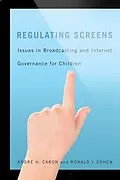The digital age has carried with it a tsunami of change. Children who have grown up with the delivery platforms that are a part of that change are now able to absorb more and more unregulated media on their own, often without any supervision. Bedroom computers, tablets, and smart phones provide private, individualized access to all kinds of content that may not be suitable for children. What rules and regulations exist to counter this potentially threatening environment?In Regulating Screens, Andr Caron and Ronald Cohen examine how governments and non-governmental organizations have been doing their part to make television and the Internet safer for children. In practical terms, they provide parents, educators, and politicians with an up-to-date inventory of the existing laws, codes, and standards in Canada, as well as information on who administers them and how they can be accessed. Given the Internet's global reach, Caron and Cohen also describe access controls in place in the United States, Australia, the United Kingdom, and the European Union. Regulating Screens offers efficient access to otherwise scattered and difficult-to-find information; it is essential reading for anyone interested in how to safeguard children against risky content, whether accessed on broadcast or virtual platforms.
Autorentext
André H. Caron is professor of communications, director of the Centre for Youth and Media Studies, and former Bell chair and director of the Centre for Interdisciplinary Research on Emerging Technologies (CITÉ) at Université de Montréal. He is coauthor, with Letizia Caronia, of Moving Cultures: Mobile Communication in Everyday Life.
Ronald I. Cohen is former national chair of the Canadian Broadcast Standards Council, founding chair of the Academy of Canadian Cinema and Television, and a senior fellow in the Faculty of Public Affairs at Carleton University.
